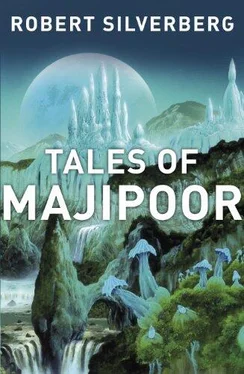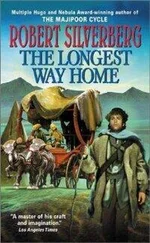Robert Silverberg - The Way They Wove the Spells in Sippulgar
Здесь есть возможность читать онлайн «Robert Silverberg - The Way They Wove the Spells in Sippulgar» весь текст электронной книги совершенно бесплатно (целиком полную версию без сокращений). В некоторых случаях можно слушать аудио, скачать через торрент в формате fb2 и присутствует краткое содержание. Год выпуска: 2013, ISBN: 2013, Издательство: Gollancz, Жанр: Фэнтези, на английском языке. Описание произведения, (предисловие) а так же отзывы посетителей доступны на портале библиотеки ЛибКат.
- Название:The Way They Wove the Spells in Sippulgar
- Автор:
- Издательство:Gollancz
- Жанр:
- Год:2013
- ISBN:978-0-575-13006-7
- Рейтинг книги:5 / 5. Голосов: 1
-
Избранное:Добавить в избранное
- Отзывы:
-
Ваша оценка:
- 100
- 1
- 2
- 3
- 4
- 5
The Way They Wove the Spells in Sippulgar: краткое содержание, описание и аннотация
Предлагаем к чтению аннотацию, описание, краткое содержание или предисловие (зависит от того, что написал сам автор книги «The Way They Wove the Spells in Sippulgar»). Если вы не нашли необходимую информацию о книге — напишите в комментариях, мы постараемся отыскать её.
The Way They Wove the Spells in Sippulgar — читать онлайн бесплатно полную книгу (весь текст) целиком
Ниже представлен текст книги, разбитый по страницам. Система сохранения места последней прочитанной страницы, позволяет с удобством читать онлайн бесплатно книгу «The Way They Wove the Spells in Sippulgar», без необходимости каждый раз заново искать на чём Вы остановились. Поставьте закладку, и сможете в любой момент перейти на страницу, на которой закончили чтение.
Интервал:
Закладка:
My first call was at the Prefecture. I bore documents establishing my family connection with Melithorn and informing me of the procedure I was supposed to follow when in Sippulgar, but even so it took me two hours to reach any official with authority to assist me in the case. He was, of course, a Hjort, puffy-faced and rough-skinned, with an enormous toadlike head. I do not like those officious creatures—who does?—but Hjorts populate our bureaucracy to such a degree that it is impossible for me to avoid frequent contact with them, and I have learned to be patient with their superciliousness and coarseness. The Hjort spent a long time pondering my papers, muttering to himself and jotting down copious notes, and said, finally, “Why are you here in place of his sister?”
I said with some restraint, “His sister—my wife—is not in a state of health that permits such a long journey. But I believe these documents make it clear that I am her officially designated representative.”
The documents I had shown him said so in the very first sentence. I refrained from pointing that out. The Hjort muttered to himself some more and at length, scowling—and when a Hjort scowls, it is with a mouth that stretches from Alhanroel to Zimroel—he scribbled something and applied his stamp of office to it and shoved it across the desk to me. It was a permit to receive the personal effects of Melifont Ambithorn, citizen of Sippulgar, legally presumed to be deceased.
His effects weren’t to be had at the Prefecture, of course. I had to cross half the city, a journey that entangled me in two more religious processions, noisy and fervid, before I reached the government storehouse where Melifont’s things were being kept. After the predictable official delays I was given three goodsized boxes, which I took back to my hotel to inspect.
One of them contained some clothing, a little cheap jewelry, and a small collection of books. There was nothing useful there. The second box, I was displeased to see, was crammed with what even I could recognize as the apparatus used in the practice of sorcery: ambivials, crucibles, alembics, ammatepilas, an astrolabe, a pair of phalangaria, stoppered flasks containing oils and powders of many colors, and various other instruments whose names I did not know. I sorted through this stuff with mounting distaste. Why had my brother-in-law, that restless, energetic man whose ambitions had driven him into all those ill-fated ventures in mining, banking, and shipping, gathered about himself such a hodgepodge of useless claptrap, such a huge collection of instruments and materials suitable only for exploiting the delusions of a credulous populace?
The answer to my question was right there in the question itself. But—perhaps it was the fatigue of my long day’s quest, or some effect of the close, humid air—it was some long while before I saw what should have been instantly obvious.
I opened the third box. In it were papers, arranged in no perceptible order: documents relating to Melifont’s many defunct business enterprises of years gone by, travel brochures, extracts from technical books, and so on, everything jumbled hopelessly together. I picked through it and was rewarded, after a time, with a small handwritten journal, practically illegible, the first entry of which was dated just eighteen months before. I leafed through it, but found my brother-in-law’s scribbled writing difficult to make out and the entries themselves cryptic to the point of incoherence, and set it aside for further study. Then came another great wad of obsolete commercial records, and, below these, the one useful find in the whole messy mass: a leather binder in which were kept a group of contracts and municipal licenses and other material, all of it just a couple of years old, pertaining to the partnership between Melifont Ambithorn and a certain Nikkon Flurivole, citizen of Sippulgar, with whom Melifont proposed to organize a firm devoted to “the enhancement and farthering of the spiritual welfare of the people of Sippulgar and the entire Aruachosian coast.”
And instantly I saw it all. My brother-in-law, having spent thirty years of his life failing at this promising project and that one, had in a desperate moment begun to dabble in sorcery, and very likely had gone on from that to set himself up in the business of starting a new religion.
Locating his partner, this Nikkon Flurivole, was my obvious next step. But there were no Flurivoles listed in the municipal directory, and a visit to the Prefecture got me nowhere, since the civic government was plainly not going to provide information about its citizens merely to gratify the curiosity of strangers from Sisivondal. In vain did I display the writ that allowed me to investigate the fate of Melithon Ambithorn, and the legal papers that showed that this Flurivole had been his partner in the last known commercial undertaking of his life. My writ, I was told, extended to information about Melithon Ambithorn and no one else.
I know how to handle such bureaucratic obfuscation. Bribing Hjorts is a fool’s game—they will take your money and report you for attempted bribery—but the city administration was not made up entirely of Hjorts, and after a couple of attempts I found a chatty little undersecretary in the Registry of Names who, for the price of a couple of bowls of good Muldemar wine looked Flurivole up for me and reported that he was, like Melifont, “no longer in Sippulgar,” that he was carried in the registry as “disappeared under mysterious circumstances,” and that his personal effects were available for claiming by the next of kin, but to date no one had filed a request for them. My jolly new friend even supplied me with Flurivole’s last known address; but when I went there—it was a residential hotel in a not very golden corner of the city—I learned that his rooms had been rented to someone else quite some while back, that the rental agent could not or would not tell me anything about Flurivole at all, and that the new tenant knew nothing about his predecessor in the building. Nor did the name of Melifont Ambithorn mean anything to him.
I was stymied. But I am a persistent man.
Often, when desired knowledge is difficult or impossible to find, it is best to stop looking for a time, and give the information a chance to come looking for you instead. I settled down to follow that tactic. I longed to be home, to dine at my own table, to sleep in my own bed, above all to hold my wife in my arms once again. Never had we spent so many days apart, and the separation was a torment to me. But I could not abandon my quest now. I had already missed the heart of the shipping season at home anyway; I did not want to return to Thuwayne with the mystery of her brother’s disappearance unsolved; and I was confident that I would sooner or later stumble upon the next clue in the puzzle.
For a week I wandered Sippulgar as a tourist might do. It is, after all, one of our most beautiful cities, well worth seeing. We of Sisivondal have learned to get along without municipal beauty in our lives, but that does not mean we are indifferent to it. So I visited the botanical gardens that Lord Tharamond had founded somewhere in the mists of antiquity, and saw more horticultural wonders in half an hour than I had in all the years of my life. I clambered to the observation deck of the immense Hendighail Tower and peered out over the Inner Sea, imagining I could see all the way to Suvrael. I looked at the masterpieces of art in the prefectorial museum. And one day I drifted down to the waterfront and discovered a street that held, cheek by jowl, half a dozen temples to the gods of alien worlds.
Sippulgar, for some reason, is home to a great many expatriate beings from other worlds. I don’t mean Hjorts or Ghayrogs or Skandars or the three or four other non-human species that have dwelled alongside us on Majipoor for thousands of years, and whose populations are thoroughly integrated into our own; I mean later comers whose numbers can be counted in the hundreds at best, scatterings from one world and another who, having come here for some commercial reason, have chosen never to return to their home planets. It may be that the mild humid climate of Sippulgar is appealing to these folk; at any rate, there are plenty of them there, of ten or a dozen different kinds, and that one particular street along the waterfront has been designated as their religious district. They have built a row of temples to their gods there, most of them small buildings, but, I discovered, dramatic and startling in their appearance, since their architecture owes nothing to Majipoori custom but is derived instead from the styles of the worshippers’ native worlds. So one building that looks like a collection of interlocking pink bubbles stands precariously close to another that is a cluster of threatening black spikes, an inverted green triangle is neighbor to a set of yellow insectoid legs reaching in suppliant fashion to the sky, and so forth.
Читать дальшеИнтервал:
Закладка:
Похожие книги на «The Way They Wove the Spells in Sippulgar»
Представляем Вашему вниманию похожие книги на «The Way They Wove the Spells in Sippulgar» списком для выбора. Мы отобрали схожую по названию и смыслу литературу в надежде предоставить читателям больше вариантов отыскать новые, интересные, ещё непрочитанные произведения.
Обсуждение, отзывы о книге «The Way They Wove the Spells in Sippulgar» и просто собственные мнения читателей. Оставьте ваши комментарии, напишите, что Вы думаете о произведении, его смысле или главных героях. Укажите что конкретно понравилось, а что нет, и почему Вы так считаете.












